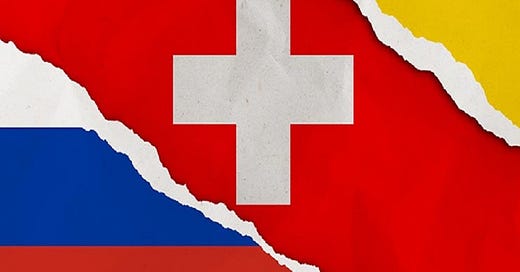If the conventional intervention scenario unfolds before this summer’s talks and no nuclear apocalypse follows, then the substance will certainly shift from entertaining Zelensky’s delusional demands to investing the time into seriously discussing a sustainable peace through a series of mutual compromises.
There’s been a lot of speculation about Switzerland’s proposal to host Russian-Ukrainian peace talks after Bern announced its intent late last month to do so by sometime this summer. Russian Foreign Ministry spokeswoman Maria Zakharova said last week that her country won’t participate if the meeting is just aimed at promoting Zelensky’s 10-point ultimatum despite reports that China wants it to attend. Politico then claimed that China might boycott the talks if Russia doesn’t show up.
It was assessed at the start of the month that “China’s Shuttle Diplomacy Will Promote Its Peace Plan But Is Unlikely To End The Proxy War” since Beijing doesn’t have the requisite influence. It actually doesn’t matter whether China participates in the unscheduled Swiss peace talks if they focus only on promoting Ukraine’s agenda since it already took part in similar ones in Jeddah last year. This analysis here suggests that China likely counteracted anti-Russian propaganda there by promoting pragmatic proposals.
That purpose is no longer relevant though since it had no impact on reshaping Western policymakers’ perceptions of the conflict and its possible endgame, so investing more time and effort into promoting the same pragmatic proposals that weren’t listened to during previous meetings won’t make a difference. It’s therefore unimportant whether or not China participates in this summer’s upcoming talks if they’re just going to be a repeat of last year’s.
Their substance could abruptly change if Russia achieves a breakthrough across the Line of Contact, however, exactly as Ukraine’s Intelligence Committee warned could happen late last month. In that event, and especially if this prompts a “coalition of the willing” (likely comprised of France, the UK, Poland, the Baltic States, and possibly Germany) to conventionally intervene, then these talks could transform into the most significant ones since the end of World War II.
Ukraine’s asymmetrical partition and President Putin’s proposed “sanitary/security zone” in that former Soviet Republic could figure prominently in their discussions aimed at creating a new security architecture, but only if everything doesn’t spiral out of control before those talks take place. After all, it can’t be taken for granted that World War III wouldn’t be sparked by miscalculation, particularly if NATO and Russian forces clash inside Ukraine or one side bombs the other’s uniformed troops there.
If the conventional intervention scenario unfolds before this summer’s talks and no nuclear apocalypse follows, then the substance will certainly shift from entertaining Zelensky’s delusional demands to investing the time into seriously discussing a sustainable peace through a series of mutual compromises. Since that sequence of events can’t be ruled out, then it’s best for everyone to prepare accordingly just in case, which China’s Special Representative is likely doing behind the scenes during his latest trip.




